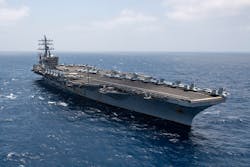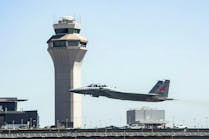ARABIAN SEA (NNS) -- As of June 25, 2020, the aircraft carrier USS Dwight D. Eisenhower (CVN 69) (Ike) and its escort ship, the guided-missile cruiser USS San Jacinto (CG 56), have been continuously at sea for 161 days, setting a new record for the U.S. Navy.
Both ships departed their homeport of Norfolk, Va., on Jan. 17, for the strike group’s Composite Training Unit Exercise (COMPTUEX) and follow-on deployment to the U.S. 6th and 5th Fleet areas of operation.
Although Naval History and Heritage Command does not specifically track continuous days underway for naval vessels, it has two modern documented days-at-sea records, both of which are now broken.
In Feb. 2002, the aircraft carrier USS Theodore Roosevelt (CVN 71) operated for 160 days straight in support of post-9/11 response. And it was again, Ike, who held the record of 152 days consecutively underway during the Iran hostage crisis in 1980.
"Our ships remain undeterred in the face of adversity and this monumental feat will only make our crews and the Navy stronger," said Capt. Kyle Higgins, Ike's commanding officer. "I'm so proud of the young men and women I see on the deck plates each and every day. Their dedication to the mission is what makes our Navy the greatest fighting force the world has ever seen."
Due to the corona virus (COVID-19), Ike and its accompanying strike group ships have remained at sea to minimize the crews’ exposure to the virus.
“In March, I suspended liberty port visits to reduce the chance of spreading and contracting the virus across the Fleet,” said Vice Adm. Jim Malloy, commander U.S. Naval Forces Central Command, U.S. 5th Fleet, and Combined Maritime. “Throughout this pandemic, maintaining the Fleet’s warfighting readiness while ensuring the safety and well-being of our Sailors has been my top priority.”
Both Ike and San Jacinto’s crews have maintained mission readiness and effectiveness despite restrictions related to COVID-19.
“San Jacinto and Eisenhower have proven their ability to remain a flexible, adaptable and persistent force while staying on station in the Arabian Sea,” said Capt. Edward Crossman, commanding officer of San Jacinto. “Both crews have been resupplying and refueling, performing repairs and upkeep, and maintaining overall readiness while continuously at sea. The two ships have spent the last five months conducting operations and exercises with foreign partners, other U.S. service branches, and U.S Navy ships in the region.”
The ships also participated in a "rest & reset" period at sea, coming off-station for a short period of time to allow the crew to relax and reenergize with morale events such as swim calls and steel beach picnics.
While all deployments bring challenges, especially ones of record-breaking duration, they also bond Sailors together through shared memories that last a lifetime.
“We’ve made it this far and I’m incredibly proud of the crew for all their hard work,” said Crossman. “The fact of the matter is our work isn’t done. We aren’t headed home yet, and we’re on path to blow the previous record out of the water. The San Jacinto Gunslingers are the most motivated, professional Sailors I have ever served with.”
Ike and San Jacinto remain at sea, deployed to the U.S. 5th Fleet area of operation in support of naval operations to ensure maritime stability and security in the Central Region, connecting the Mediterranean and Pacific through the Western Indian Ocean and three critical chokepoints for the free flow of global commerce.
“Ike and San Jacinto, along with the rest of the Ike CSG, have continued to stand the watch in this critical region of the world, conducting routine operations and maintaining constant readiness and I couldn’t be prouder,” said Malloy.
An interesting fact, the first USS San Jacinto was also underway during a yellow fever epidemic during the Civil War. On May 5, 1862, under the orders of President Lincoln, San Jacinto and other union warships bombarded Sewell’s Point, Virginia. On August 1, 1862, it was reported that yellow fever had broken out on the ship, so San Jacinto sailed north, laid anchor, and quarantined for four months.



